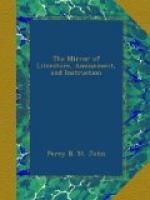* * * * *
FIRST ENGLISH COLONY IN AMERICA.
The first attempt of the English to effect any settlement in America, was made by Sir Humphrey Gilbert, who, in the month of June, 1578, obtained a patent from Queen Elizabeth, authorizing him to plant a colony in that country. Gilbert’s project failed; but it was afterwards resumed by his half-brother, the celebrated Sir Walter Raleigh, who, in 1584, obtained a patent similar to that which had been granted to Gilbert, and next year planted a colony at the mouth of the Roanoke, naming the country Virginia in honour of his royal mistress. But all these settlers, as well as others who crossed the Atlantic during the next twenty years, either perished by famine and disease, or by the hands of the Indians, or returned to England.—Cabinet Cyclopaedia, vol. xiii.; being vol. i. of the History of the Western World—United States of America.
* * * * *
TRADITIONS OF THE INDIANS.
According to the unambitious belief of the Osages, a people living on the banks of one of the lower tributaries of the Missouri, they are sprung from a snail and a beaver. The Mandans believe their ancestors once lived in a large village under ground, near a subterranean lake; that by means of a vine tree, which extended its roots to their cheerless habitation, they got a glimpse of the light; that informed by some adventurers, who had visited the upper world, of the numerous buffaloes pasturing on the plains, and of the trees loaded with delicious fruits, the whole nation, with one consent, began to ascend the roots of the vine; but that, when about the half of them had reached the surface, a corpulent woman climbing up, broke the roots by her weight; that the earth immediately closed, and concealed for ever from those below the cheering beams of the sun. From a people who entertain such fanciful notions of their origin, no valuable information concerning their early history can be expected.—Ibid.
* * * * *
POLITE SLAUGHTERING OF AN ENEMY.
At times, an Indian warrior, when about to kill and scalp a prostrate enemy, addresses him in such terms as the following:—




